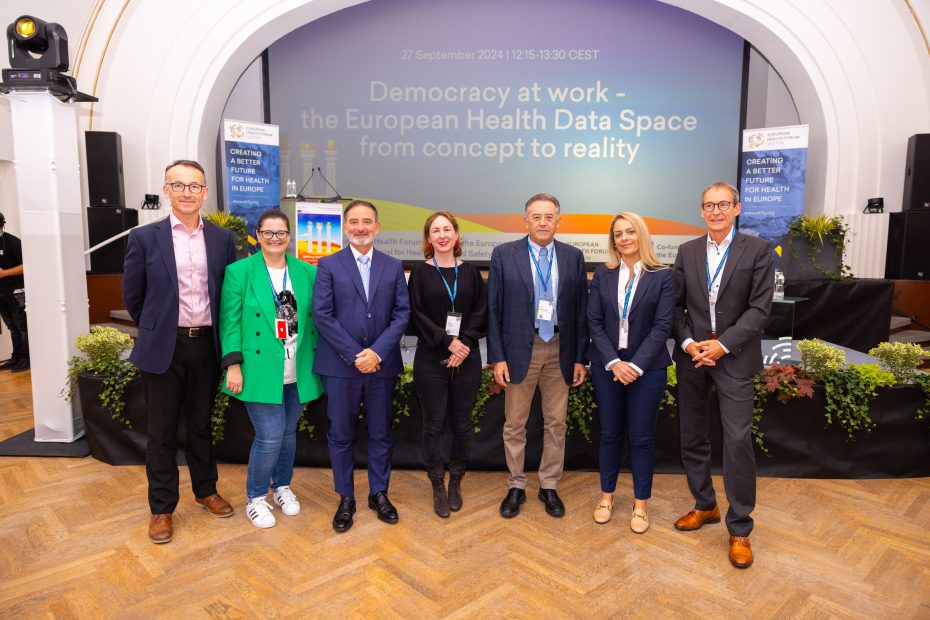© framez./European Health Forum Gastein.
With the title “Shifting sands of health: Democracy, demographics, digitalisation,” a four-day hybrid conference took place from 24th to 27th of September in Bad Hofgastein, Austria (https://www.ehfg.org).
With over 25 sessions, three major plenary discussions, and extensive networking opportunities, the 27th European Health Forum Gastein brought together representatives from science, academia, civil society, industry, and a small number of patient representatives. Discussions covered topics such as digitalisation and digital health, healthcare in Europe, social values, the crucial theme of brain health, gender health equity, data solidarity, artificial intelligence, and, of course, the European Health Data Space (EHDS) and the opportunities it offers to EU Member States and their citizens. Over 1500 participants engaged actively in sessions, breaks, and smaller group discussions. Whether during an early breakfast or at evening networking events, information exchange took place, sparking new ideas and inspirational thoughts.
The final plenary session, which focused on EHDS, was especially interesting. Titled “Democracy at work – the European Health Data Space from concept to reality,” it featured a diverse panel representing different stakeholder groups. This session was organised by the European Health Forum Gastein and the European Commission Directorate-General for Health and Food Safety (DG Sante).
Speakers included Marco Marsella, Director of Digital, EU4Health, and Health Systems Modernisation at DG Sante, who mentioned in his keynote that digital health and health data are vital for Europe. The upcoming European Health Data Space will be a great benefit for all EU citizens. He also spoke about the European Electronic Health Record Exchange Format (EEHRxF), describing it as a helpful tool for citizens to receive care across the EU and share health data for better research, development, and care. Doctors in hospitals can work with data shared between countries, resulting in better research, more efficient care, and improved patient outcomes throughout the EU. He underlined the value of health data and the opportunities the EHDS presents to EU citizens with the new upcoming formats.
“The European Health Data Space is more than just a policy initiative; it is a vision,” said Marsella in a press release and reiterated in his speech. “It aims to harness the power of health data to enhance citizens’ well-being, improve healthcare systems, and foster innovation across Europe.”
https://www.ehfg.org/fileadmin/downloads/21-press/2024/Closing_PR_27_Sept_EN.pdf.
Luis Martí-Bonmatí, Director of the Medical Imaging Department and Chairman of Radiology at La Fe University and Polytechnic Hospital in Valencia, Spain, engaged in a discussion with Birgit Bauer, an international Digital Health and Social Media expert and XpanDH Consortium Member, and Patient Expert and Coordinator of the patient-driven initiative Data Saves Lives (Germany), about the next steps and changes in the healthcare system. “I am a big fan of the EHDS, to be honest,” Bauer stated, surprising some in the audience. “If we explain the benefits and involve people, we can move forward. As a consortium member of the EU-funded project XpanDH, I can see what we can do within this framework to improve healthcare.” However, she also noted that there is still a lot of work to be done and significant distrust in some countries that needs to be addressed. Martí-Bonmatí emphasized the perspective of doctors in hospitals. While bringing in the tools may not be easy, he sees their value and recognizes the ethical questions surrounding their implementation.
The following panel discussion, moderated by Nick Fahy, Research Director at RAND Europe, included Uwe Heckert, Head of Enterprise Informatics Europe & Managing Director at Philips DACH, Catia Pinto, Head of the Global Digital Health Department, Shared Services of Ministry of Health, Portugal, and Barbara Prainsack, Professor of Comparative Policy Analysis, University of Vienna, discussed best practices, the most promising aspects of the EHDS, and possible collaborations under the new framework. The session was insightful and innovative, bringing together perspectives from different stakeholders, and at times, offering valuable critical viewpoints.
Birgit Bauer summarized the key takeaway: “We must ask the right questions and consider all opinions. It is important to clarify misunderstandings within the patient and citizen community caused by insufficient or unclear communication.” She emphasized the need for participatory action to involve patients and citizens in the ongoing developments around the EHDS. “We need to listen and learn as patients are among the first affected by new tools or solutions.” The experts agreed but also discussed the importance of addressing the social contract theme and why it needs to be considered. Moreover, communication and accessible information are crucial, especially given the current “infodemic.”
There is much work to be done in Europe, but digital health is on its way. We must ensure that all citizens have the opportunity to be part of the digital transformation, with proper information, participatory action, and valuable resources. This will ensure we have the tools to handle challenges, especially in the case of an infodemic.
Author: Birgit Bauer, edha – european digital health academy gGmbH
